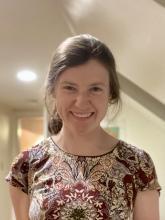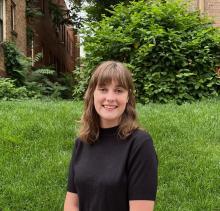Our Institute for Public Health Genetics Alumni have found positions at many employers.
Recent Graduate Profiles

Charleen Adams
Charleen, currently a research fellow at the Harvard School of Public Health, is a geneticist, epidemiologist, and computational biologist with training in linguistics, cancer research, and nucleolar biology. She studies everything from molecules to behavior, using transcriptomic Mendelian randomization, epigenetics, and machine learning. Her aims are to discover novel regulatory causes of diseases in human populations and to understand what makes us who we are and why we age. At the UW, her dissertation combined epigenetics and ethics. She explored DNA methylation in shift workers (with Dr. Parveen Bhatti) and the ethical landscape of working at night (with Dr. Wylie Burke).
- differential genome-wide DNA methylation in association with nightshift work

I-ling Chen
I-Ling Chen received a Master of Public Health (MPH) in Public Health Genetics. She received her M.D. from Mackay Medical College in Taipei, Taiwan, and completed her residency training in family and geriatric medicine at National Taiwan University Hospital. Her academic and professional interests include precision medicine, chronic disease management, and healthy aging.
- Aging
- Metabolic disease

Jacklyn Dahlquist
Jacklyn recently completed her MPH in Public Health Genetics. Her interests are prenatal testing and newborn screening and bioethics.
- Prenatal testing and newborn screening
- Bioethics

William Gordon
William is an MSGE alum interested in the social and legal implications surrounding genomic diagnostics in the clinical setting.
- Social and legal implications surrounding genomic diagnostics

Louisa Goss
Louisa Goss is a MS student with a background in biology, having earned her B.A. in Biology from Williams College. She is passionate about leveraging genomic data to improve cancer detection and understanding the interplay between social, environmental factors, and genetics in the development and progression of cancer. Louisa's primary academic interests revolve around translating genomic findings to cancer prevention and exploring gene-environment interactions. With her sights set on pursuing a PhD in epidemiology, Louisa aspires to contribute to the field of academic research and further advance our understanding of cancer prevention and treatment.
- Translating genomic findings to cancer prevention
- Gene and environment interactions

Shira Grayson
Shira is an MPH genetics alum interested in the genetic, nutritional, environmental, and behavioral factors that influence disease risk and prevention. She received her B.S. in Biology and Global Health from the University of Wisconsin-Madison in 2014. Since then, she has worked at the University of Minnesota as a research assistant in the Department of Food Science and Nutrition, at two non-profit health organizations in Minneapolis coordinating health advocacy and education initiatives, and at the International Society for Stem Cell Research in Chicago.
- Genetic epidemiology
- Epigenetics & nutrigenomics
- Developmental origins of health and disease
- Ethical Legal and Social Implications (ELSI) of genetics

Taryn Hall
Taryn Hall’s research interests are focused on precision phenotyping, gene identification, risk and phenotype prediction, and the translation of genetic discoveries to society. She has several domains of interest including: chronic pain, medically unexplained conditions, disorders in pregnancy, precision medicine, and forensic genetics.
- precision phenotyping, gene identification, risk and phenotype prediction
- chronic pain, medically unexplained conditions, disorders in pregnancy, precision medicine, and forensic genetics
- translation of genetic discoveries to society

M. Ragan Hart
PhD Public Health Genetics
M. Ragan Hart, holds an MS in Genetic Epidemiology and a PhD in Public Health Genetics from IPHG at UW, where she investigated gene-environment interactions in patients using warfarin.Currently working in Medical Genetics, she recognizes a myriad of factors exist in the implementation of clinical sequencing into healthcare, and thus, her research interests lie at the intersection of health economics, clinical validation, and health policy.
- The intersection of health economics, clinical validation, and health policy

Taylor Johnson
PhD, Public Health Genetics
Taylor earned her PhD in Public Health Genetics in 2025. She previously earned an MS in Genetic Epidemiology and is interested in the genetic and environmental relationship that influences susceptibility of infectious diseases. Taylor wants to conduct research discovering genetic susceptibility to disease and host-gene interactions that influence disease progression.
- The genetic and environmental relationship that influences susceptibility of infectious diseases
- Global health and disease outbreak

Fa Kul
Fa recently completed her MPH in Public Health Genetics. Her interests are forensic genetics, newborn screening, and pediatric genetics.
- Forensic genetics
- Newborn screening
- Pediatric genetics.

Yunqi Li
As part of her PhD studies, Yunqi was a research assistant working with Dr. Jairam Lingappa and Dr. Romel Mackelprang from the International Clinical Research Center at Department of Global Health. Their research focuses on using transcriptome analysis to identify intrinsic factors involved in HIV-1 acquisition and infection pathogenesis.
- Applying genomic data analysis in biomedical/public health studies

Thyvu Mai
Prior to joining the UW community, Thyvu worked as a clinical laboratory scientist diagnosing genetic disorders. Drawing upon her clinical background and public health interests, she is pursuing an MPH in PHG with the goal of expanding her role in health promotion beyond the laboratory setting to more direct community interventions.
- Health promotion beyond the laboratory setting

Caitlin Maloney
Caitlin Maloney received her MPH in Public Health Genetics from the University of Washington and BS in Biology from Baylor University. Prior to joining the IPHG, she worked as a clinical scientist in a molecular diagnostics laboratory. While at the Institute, Caitlin investigated ethical considerations and epidemiological data regarding children with trisomy 13 and 18 requiring cardiac surgery and respiratory support. Her thesis highlighted “the politics of probability” and how values and roles shape the understanding of data in pediatric decision-making, especially for children with disabilities. Caitlin’s research and training are grounded in ethical, legal, and social implications of genetics. She has a particular interest in how genomic technologies intersect with the criminal legal system and health and disability law.
- intersection of genomic technologies with the criminal legal system
- health and disability law

Sarah Catherine Nelson
PhD Public Health Genetics
Sarah Catherine Nelson is an alum of the Public Health Genetics MPH and PhD programs and works as a Research Scientist in the Department of Biostatistics’ Genetic Analysis Center. Her dissertation examines how customers of direct-to-consumer genetic testing are using their uninterpreted genetic data. Sarah writes about her dissertation work and related topics on her blog at myopenreadingframe.com.
- Direct-to-consumer testing
- Raw data access
- Third-party interpretation
- Science, Technology, and society studies

Elizabeth Oestreich
Elizabeth Oestreich, MPH alum, is interested in Ethical, Legal and Social Implications (ELSI) around genetics. She completed her BS in Biology at UW in 2016. She is currently serving as a student representative for the department, a GPSS senator, a member of the Deans Advisory Committee for Students (DACS), and a member of the Services and Activity Fee (SAF) committee. In her free time she is a mother of 2 and a wife.
- Ethical, Legal and Social Implications (ELSI) around genetics

Alice B. Popejoy
Alice B. Popejoy, PhD in Public Health Genetics, has a B.A. from Hamilton College in Biology and French and earned a Certificate in Statistical Genetics from the departments of Statistics and Biostatistics at the University of Washington. Her research in Public Health Genetics is interdisciplinary across computational biology and bioinformatics, protein family evolution, statistical genetics, and bioethics. She is graduating in Autumn 2017 and will begin a postdoctoral scholar position with Dr. Carlos Bustamante in the Department of Biomedical Data Science at Stanford University.
- Comparative evolutionary genomics
- Photoreceptor gene families (opsins)
- Race, ancestry, and genomics
- Ethical, legal, social implications (ELSI) of genetics research

Viveka Raol
Viveka Raol earned an MPH in Public Health Genetics. The MPH adds to a diverse educational background, including a BS in Biochemistry & Zoology from St Xavier’s College (Mumbai), an MS from the University of Massachusetts, and an MBA from the University of Washington - Foster School of Business. Viveka began her career as a research scientist in hybridoma development, followed by her role as a Senior Associate Scientist at Amgen. Currently, she works as a Project Manager in Cellular Therapeutics at the Fred Hutch Cancer Center (FHCC), where she supports targeted immunotherapies for the treatment of hematological cancers.
Viveka is particularly interested in evaluating opportunity costs from traditional cancer treatments, such as stem cell transplants and associated therapies, and studying the economic evaluations and budget impact analysis of new therapies. She aims to contribute to the optimization of healthcare resources and the development of more effective and efficient treatments for patients.
- Health Economics/Cost Effectiveness Strategies/Budget Impact Analysis
- Epidemiology
- Genetics/Genomics
- Biostatistics

Aparajita Saha
Aparajita Saha is an MS student with a medical background, having earned her MBBS from Sir Salimullah Medical College, Bangladesh. Her primary interest lies in investigating the genetic association with Mycobacterium tuberculosis (Mtb) infection and clinical outcomes in high burden areas.
Aparajita's academic focus is on the interaction between host genetics and infectious disease susceptibility, along with their various clinical outcomes. Her ultimate goal is to become an academic researcher, contributing to the understanding of the complex relationship between genetics and infectious diseases. Through her research, she aims to inform and improve public health strategies to combat and prevent infectious diseases in high burden areas.
- Host genetics
- Infectious disease susceptibility
- Clinical outcome/research

Emma Sears
Emma Sears is an MPH student who has earned her B.S. in Health and Exercise Science with a concentration in Sports Medicine from Colorado State University. She is particularly interested in examining how disease rates are influenced by the intricate relationships between genes, environment, and lifestyles.
Her goal involves conducting fieldwork to survey and research different communities, aiming to better understand disease rates in relation to genetic and environmental variations. Emma is dedicated to making a positive impact on public health through her research and contributions to the field.
- Genetic epidemiology
- Epigenetics
- Chronic Diseases

Olivia Sommers
Broad interest in ELSI, qualitative research, and Science and Technology Studies. Research interest in attitudes and perceptions of genetics among providers and the general population. Research experience is in the perception of the relationship between race and genetics in online communities.

Scott Spencer
Scott recognizes the many different factors are required for adaption and utilization of clinical sequencing and other emerging biotechnologies in healthcare settings. His research interests are focused on the intersection of health economics, precision and personalized medicine, public policy and bioethics.
- The intersection of health economics, public policy, and bioethics

Aditya Sriram
Aditya completed the Genetic Epidemiology M.S. program at the University of Washington and graduated with a B.S. in Genetics and Genomics from the University of California, Davis in 2020.
In his time at UW, he applied and furthered his knowledge in genetics and genomics in both computational approaches and epidemiological contexts. As a member of Dr. Gavin Ha's Lab at the Fred Hutchinson Cancer Center, he conducted gene expression analysis of circulating tumor DNA from pediatric neuroblastoma in collaboration with Dr. Brian Compton from the Dana-Farber Cancer Institute. Additionally, he conducted his thesis with the guidance of Dr. Kathleen Kerr and Dr. Bruce Weir. He investigated genetic risk factors associated with SARS-CoV-2 susceptibility in multiethnic populations.
Aditya will be continuing his education at the University of Pittsburgh as a Human Genetics PhD student. He is conducting research with Dr. HJ Park's lab, which helps develop data-science techniques, AI-driven tools, and statistical inference methods to elucidate large-scale molecular biological dynamics hidden across multiple regulatory layers for complex diseases, such as cancer and sepsis.

McKenna Tennant
McKenna Tennant, MPH in Public Health Genetics, is interested in policy issues in genomics. Her particular interests include the regulation of genetic tests; coverage and reimbursement of clinical sequencing; and the ethical, legal, and social implications of genetic research and technologies, specifically with regard to accessibility and health disparities. McKenna holds a BA in History of Science, Medicine, and Public Health from Yale University, where she studied the history of genetic engineering and government regulation of transgenic animals.
- Policy issues in genomics Ethical, legal, and social implications

Kathleen (Kate) West
Kate West's dissertation draws from a virtue and feminist ethics framework in a mixed methods study of trustworthy research practices within partnerships between communities and university-based researchers, including specific considerations for genomics. For more information about her work, please visit
- Trustworthy research practices within partnerships between communities and university-based researchers

Diane Xue
Diane Xue is currently a postdoctoral fellow in the Department of Genetics at the University of Pennsylvania. Her research integrates genomics, environmental exposures, and multi-omics to investigate the biological mechanisms driving Alzheimer’s disease health disparities. Her work aims to advance equitable precision medicine and inform both targeted interventions and public health policy.
- Alzheimer’s disease health disparities
